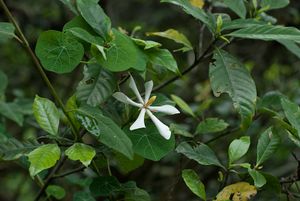Note: This is a project under development. The articles on this wiki are just being initiated and broadly incomplete. You can Help creating new pages.
Difference between revisions of "Gardenia jasminoides - Gandhraj"
m (Prabhakar moved page Gandhraj to Gandhraj ( Gardenia jasminoides)) |
m (Prabhakar moved page Gandhraj ( Gardenia jasminoides) to Gardenia jasminoides - Gandhraj) |
(No difference)
| |
Revision as of 08:55, 23 April 2018
Gardenia jasminodiesis an evergreen flowering plant of the family Rubiaceae. It originated in Asia and is most commonly found growing wild in Vietnam, Southern China, Taiwan, Japan, Myanmar, and India. With its shiny green leaves and heavily fragrant white summer flowers, it is widely used in gardens in warm temperate and subtropical climates, and as a houseplant in temperate regions. It has been in cultivation in China for at least a thousand years, and was introduced to English gardens in the mid 18th century. Many varieties have been bred for horticulture, with low growing, and large-and long-flowering forms.
Description
Gardenia jasminoides is a shrub with greyish bark and dark green shiny evergreen leaves with prominent veins. The white flowers bloom in spring and summer and are highly fragrant. They are followed by small oval fruit.[1]
Uses
- This species has been widely grown as an ornamental. In China, Taiwan, and Japan, it is commercially cultivated to make jellies from the fruit.
- The fruit is used as a yellow dye,[7] which is used for clothes and food.
- Gardenia jasminoides fructus (fruit) is used within traditional Chinese medicine to "drain fire" and thereby treat certain febrile conditions.
Common name
- English - Gardenia
- Kannada - ಸುವಾಸನೆ ಮಲ್ಲೆ
- Hindi - गंधराज
